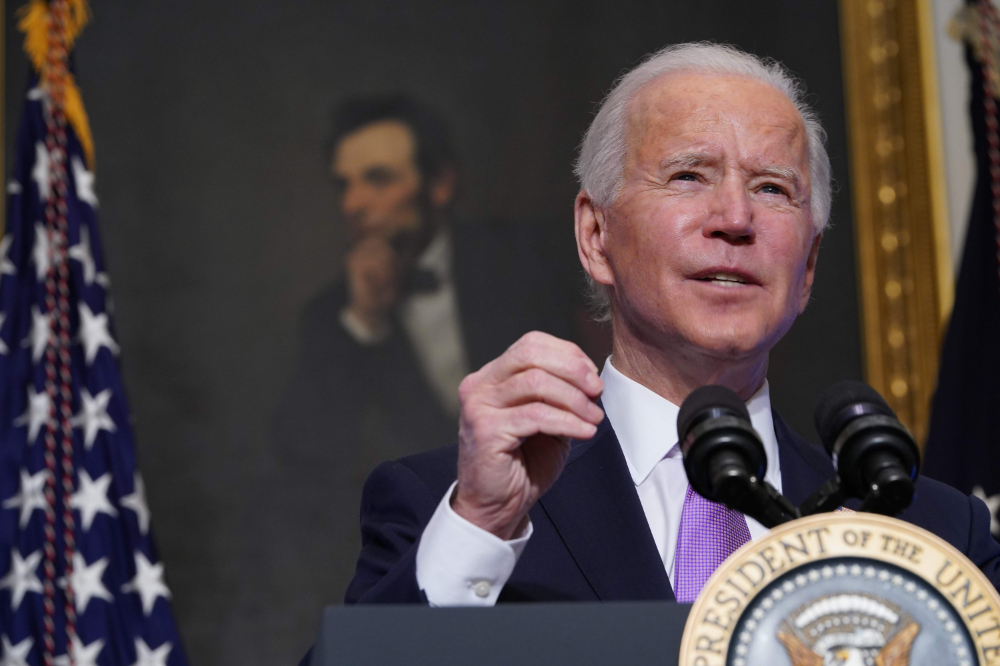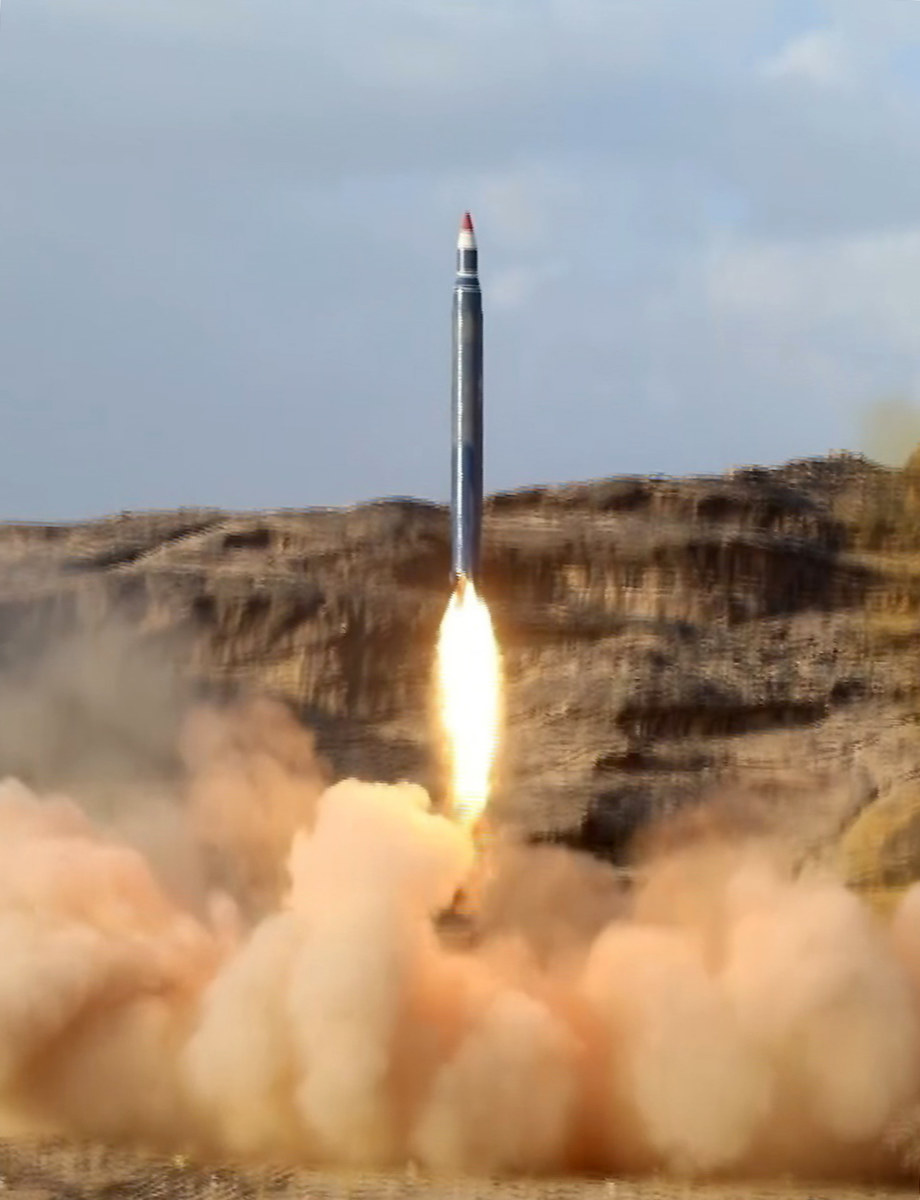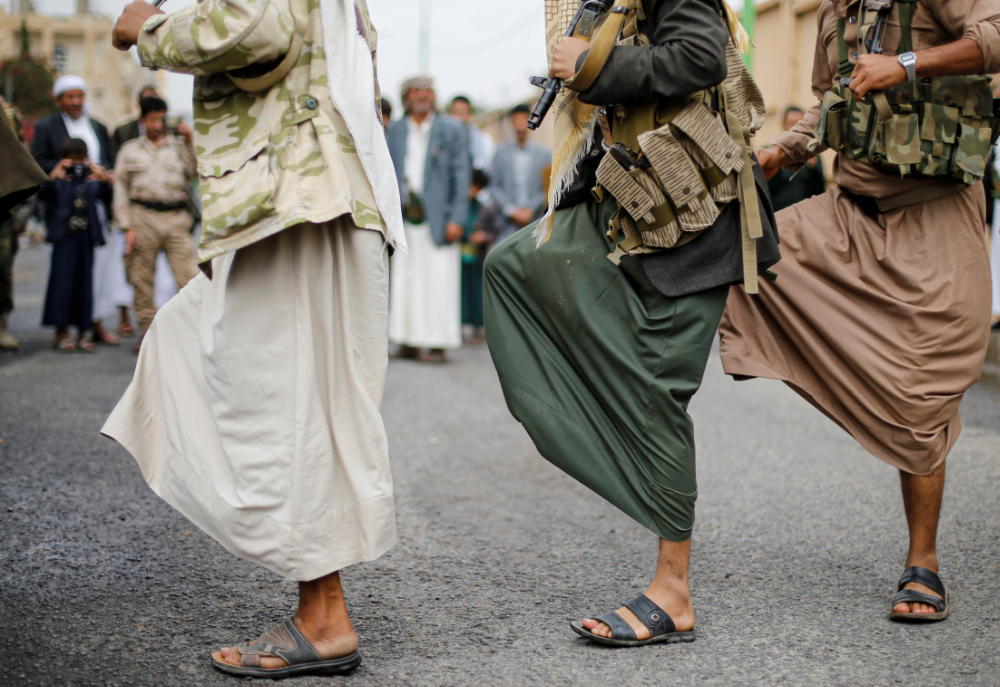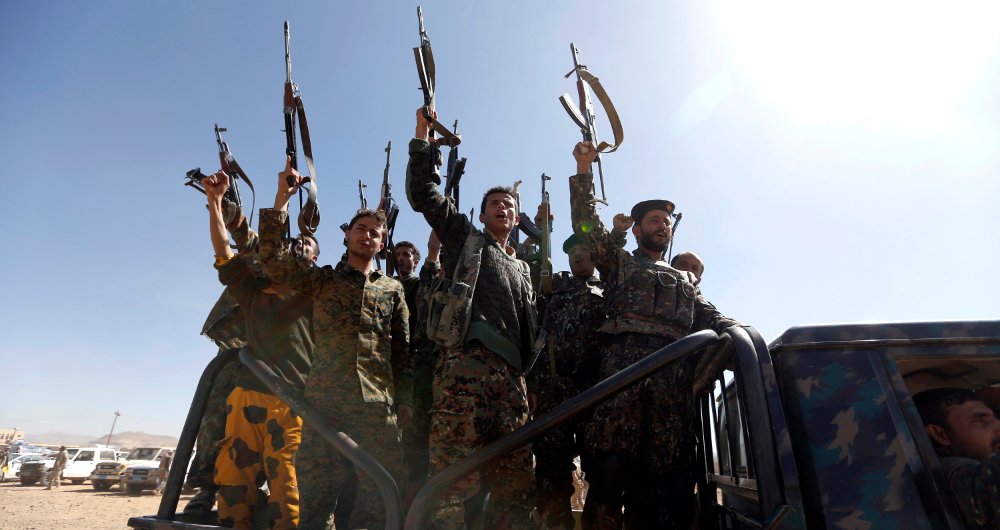LONDON: Was the object sighted high above Riyadh on Tuesday a stray projectile with no evident target or a warning shot across the bows of the Biden administration? That was the question uppermost in the minds of defense experts and political analysts, just three days after a “hostile air target” — assumed to be a ballistic missile — heading towards the Saudi capital was intercepted and destroyed.
Social media was abuzz on Tuesday with footage of smoke hanging over Riyadh, with residents describing how the windows of their homes were rattled by the impact of at least one explosion. By late evening, Yemen’s Iran-backed Houthis had not crowed about a direct hit on the city of 7.68 million people. The militia’s behavior ran true to recent form: it had denied involvement in Saturday’s failed attack.
But the fact of the matter is, these could be the first significant attacks targeting a major Saudi city since the US State Department designated the Houthis (also known as Ansar Allah) as a “Foreign Terrorist Organization” on Jan. 19 — one of the final acts of the Donald Trump administration in its “maximum pressure” campaign against Iran and its proxies.

Without naming the Houthis explicitly, the Biden administration issued a statement after Saturday’s incident, condemning the undeniable targeting of civilians. “Such attacks contravene international law and undermine all efforts to promote peace and stability,” the State Department said.
To many political observers, the new Houthi approach is a complete no-brainer: Threatened with sanctions and political isolation, and desperate for potential concessions from Washington, the militia is trying to have its cake and eat it too by launching attacks on Riyadh and not claiming responsibility for them.
RELATED:
“There is no doubt that after evaluating the international response and noticing that a claim of responsibility would be counterproductive — especially after being classified by the State Department as “terrorists” — the Houthis tried to deny they were behind Saturday’s attack,” Hamdan Al-Shehri, a political analyst and international relations scholar, told Arab News.
“However, everyone knows that the Houthis, backed by Iran, are the ones who carry out such terrorist acts and use ballistic missiles and drones. They also tried to get on the new US administration’s good side by denying what happened in the Kingdom. But everyone knows who is responsible for these actions.”

According to experts, the Houthis have a strategy of swinging between bragging about targeting population centers and maintaining plausible deniability. In other words, they pick and choose whichever attitude suits their objectives, and those of their Iranian patrons, at any given time.
Put bluntly, the brazen strikes targeting Saudi Arabia’s capital may not be routine tactical operations in a low-intensity conflict but rather reflective of a larger strategic decision by Iran to put President Joe Biden’s foreign-policy team on notice.
The Trump administration withdrew the US from the Obama-era nuclear accord with Iran in May 2018 and reimposed a slew of economic sanctions on the regime in Tehran. The strategy was matched by a zero-tolerance approach to Iranian influence in Yemen, Iraq, Syria, Lebanon and Palestine.
The US Treasury on Monday suspended some of the terrorism sanctions that the State Department had imposed on the Houthis in President Donald Trump’s waning days in office. Against this backdrop of apparent policy reviews, a flurry of attacks on Washington’s regional allies and partners could very well be attempts by Tehran to test President Biden’s resolve or, with luck, even kickstart dialogue.
“There is no doubt that Iran wants to test the new administration to know how serious it is regarding the Yemeni issue and the Iranian nuclear issue, and it wants to negotiate with more than one card,” Al-Shehri told Arab News.
“It is as though to say: ‘If you are willing to reduce the pressure on the nuclear issue, we will reduce the pressure on targeting Riyadh.’ This is nothing but cheap and shameless political blackmail, and the world knows it.”
“Cheap and shameless” is also one way to describe the Houthis’ penchant for targeting civilian population centers, often hundreds of miles inside Saudi territory.
March 26, 2018, saw one of the biggest Houthi barrages, with Iranian-supplied ballistic missiles raining down on civilian areas in four Saudi cities. Three of them targeted Riyadh, while two were aimed at Jazan and the others at Khamis Mushayt and Najran.

Although Saudi air defenses intercepted all seven missiles, an Egyptian civilian was killed by falling debris and two others were injured. All of the attacks appear to have deliberately targeted populated areas.
“Launching indiscriminate attacks is prohibited by international humanitarian law,” Amnesty International’s Samah Hadid said at the time.
“A high death toll may have been averted, possibly due to the missiles being intercepted, but that doesn’t let the Houthi armed group off the hook for this reckless and unlawful act. These missiles cannot be precisely targeted at such distances, so their use in this manner unlawfully endangers civilians.”
Riyadh, which is roughly 850 km from the Yemeni border, was first attacked by the Houthis on Nov. 4, 2017, when an unguided ballistic missile targeted King Khalid International Airport — about 35 km northeast of the capital.
Although the missile was intercepted in flight, fragments fell inside the airport area. No one was hurt, but the result could have been catastrophic.
This section contains relevant reference points, placed in (Opinion field)
“An attack with an unguided ballistic missile such as the Burkan H2 from this range is indiscriminate since these weapons are not capable of the necessary accuracy to target military objectives,” Human Rights Watch said at the time.
“When deliberately or indiscriminately directed toward populated areas or civilian objects, such attacks violate the laws of war, and may amount to war crimes.”

A year earlier, in Oct. 2016, a missile, thought to have been a Burkan 1, was intercepted by Saudi air defenses just 65 km south of Makkah. The Houthis claimed at the time their intended target was Jeddah’s King Abdulaziz International Airport.
Civilians have been in the Houthis’ crosshairs since the very beginning of their takeover of Sana’a. In May 2015 there were repeated indiscriminate attacks with short-range rockets from northern Yemen into populated areas of southern Saudi Arabia, which left several civilians dead.

Fighting in Yemen escalated in 2015 when the Houthis overthrew the UN-recognized government of President Abed Rabbo Mansour Hadi. An Arab coalition, backed by the US, Britain and France, launched a military campaign to restore the legitimate government to power.
Since then, repeated attempts to reach a peace settlement have foundered, with the militia’s representatives failing to attend UN-brokered talks in Geneva in Sept. 2018 and its combatants willfully ignoring the terms of the Stockholm and Riyadh agreements.
An April 2020 ceasefire announced by the coalition at the onset of the COVID-19 pandemic quickly fell apart when the Houthis resumed cross-border drone and missile strikes targeting Saudi Arabia.
The conflict, now in its sixth year, has left 112,000 dead and 24 million in dire need of humanitarian assistance.
Twitter: @RobertPEdwards
Twitter: @Tarek_AliAhmad




